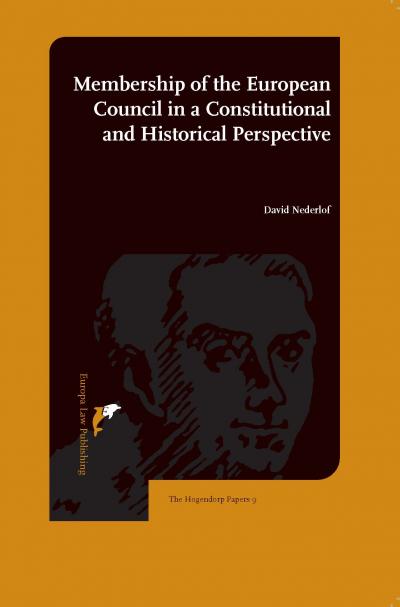Heads of state or government of the member states of the European Union have a dual role: they are and remain holders of domestic executive offi ces, but at the same time members of the European Council – the EU institution that is the centre of political authority within the Union. This membership, approached here from a constitutional and historical perspective, is autonomous to the extent that it is attributed to the heads of state or government and substantively determined by the EU’s constitution. It is a key part of the EU structure and fundamental for comprehending the executive branches of the Union and of the member states as well as their relationship. The present study analyses the force of the dualitythat membership entails for the accumulation of authority within the European Council. It investigates for a number of member states – The Netherlands, Belgium and Germany – whether and how European Council membership has become compatible with and has affected domestic constitutional positions, domestic executive institutions and systems at large. It contributes to the understanding of the relation between national executives and the Union. While this relation is usually considered as one-dimensional, this study shows that the situation is more complex and interesting.
David Nederlof is lecturer in EU law and member of the Research Group Changing Role of Europe at The Hague University of Applied Sciences. This book is the result of the Ph.D. research project that he conducted at the Law Faculty of the University of Amsterdam.
Acknowledgements
Contents
Introduction
Introduction
Aims and scope
Discipline and approach
Outline
Chapter 1 The Creation, Foundation and Exercise of European Council Membership
1 The establishment of the European Council by its future members
2 On membership
3 On dual roles
4 Development of the autonomous mandate for the members of the European Council
5 Membership of international organizations and their organs: the fundamental distinction between member and representative as a fundamental difference between the European Union and other international organizations
6 Early legal and theoretical considerations on membership of the Council of Ministers
7 The exercise of European Council membership
Chapter 2 The Netherlands
1 The position of the Prime minister until 1960
3 The position of the Foreign Affairs minister
4 Consensus on the Prime minister’s European Council membership
5 European Council membership as a distinct status
6 European Council membership as a driving force of permanent change since the 1990’s
Chapter 3 Belgium
1 The Prime minister’s European Council membership and the federal level of government
2 The prime minister’s European Council membership and the Belgian federal system
Chapter 4 Germany
1 Konrad Adenauer’s shaping of Germany’s European policy and the Chancellor’s constitutional position.
2 Continuity under the social-liberal governments (1969-1982)
3 Taking responsibility for national and European developments at both levels: Helmut Kohl and the fall of the Berlin Wall
4 The settlement of the Chancellor’s European Council membership since 1992
Concluding Remarks
1 The significance of membership for the accumulation of authority in the European Council
2 The significance of European Council membership for the selected member states
3 The significance of European Council membership for the relation between national executives and the Union – structural tensions and developments related to European Council membership
Sources


